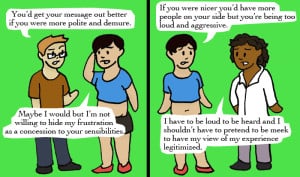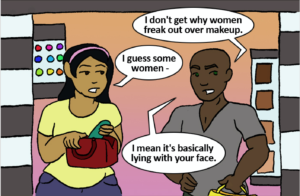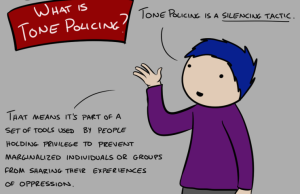
A person lies in bed, smiling.
Erotic humiliation is my thing. And while it’s exciting now, it used to be a source of incredible anxiety and distress for me.
If you can think of something truly embarrassing – something you could never imagine someone witnessing or subjecting you to – I’ve probably tried it in the bedroom once before. And as you can imagine, it wasn’t something I was proud of or particularly interested in broadcasting to the world.
It’s not exactly easy to turn to your sweetheart and say, “I ordered a dog bowl off of Amazon” or “This seems counterintuitive, but I actually want you to call me f*ggot.” I didn’t understand why I was this way – just that I must have been the worst person alive because of it.
Shame is powerful. And when shame starts to interfere with our self-esteem, our relationships, and/or our a/sexuality, it can start to take its toll.
When I started seeking out community around kink, I realized every one of us has experienced some kind of shame or stigma.
So many people told me about the depression, anxiety, isolation, and even despair that they felt around their kink – even though it wasn’t harming anyone, and it was 100% safe and consensual.
And you know what? I think that’s garbage.
Kink can be such an exciting and enlivening experience! It can foster new connections, help us explore parts of ourselves we didn’t know existed, and it can be downright sexy.
It took me years to come to a place of acceptance with my kinky self. This is, in large part, because for a long time, there wasn’t anyone around to affirm for me that it was okay to be kinky in the first place.
That’s why I think it’s so important to put narratives out into the world that counter all the negative messages we get about kink.
And I’m not just talking about tying someone up (though if that’s your thing, power to you!). I’m talking about anyone who ever wanted to fuck an alien, roleplay as a horse, wear a diaper, worship feet, and all the other fun stuff that makes people squirm.
No matter what your kink might be – however embarrassing or far out you might think it is – here are six affirmations that I want you to think about the next time you’re feeling bummed out.
1. There’s Nothing Wrong with You
Or phrased another way, “It’s not you. It’s society.”
When something is a taboo, that doesn’t make it inherently wrong or bad on its own.
In a culture that demonizes and moralizes a/sexuality as a whole – especially a/sexuality that exists outside of monogamous, vanilla partnerships – practically everyone is a “deviant” in some shape or form.
But that’s society’s baggage, not yours.
There are so many myths about kink – and they’re centered on the false idea that kinky people are broken or deviant, which simply isn’t true.
Are you being safe? Are you getting affirmative consent? Are you making sure not to harm anyone? Are you communicating openly with your partner(s)?
These are the questions that should matter – and the fact that our culture seems more concerned with what people are doing, rather than how safely and responsibly folks are doing it, points to a larger issue with how we view and educate folks in this society.
And I don’t know about you, but I’m engaging with these questions constantly, as are most of the kinky people I know. If anything, that says to me that we’re doing something right.
2. You Aren’t the Only One
Not too long ago, I was having dinner with one of my best friends. After we started talking, we discovered that we shared some of the same exact kinks.
We never thought in a million years that we’d meet someone in-person who was into it, let alone someone that had been there all along. And, yet, there we were.
I never saw it coming. Not only was this a huge relief – it actually brought us a lot closer together.
This taught me a really important lesson about the assumptions I was making. Namely, that kinky people only existed in obscure corners of the Internet and that I couldn’t possibly find someone who liked the same things.
It’s really comforting to know that kinky folks are real – that they aren’t just magical unicorns that exist only in our imagination.
It can take some time to find a community, but whether it’s online or off, I can promise you that you aren’t alone.
Who knows. Someone you see every day might be into the same thing!
3. It Doesn’t Matter How ‘Weird’ It Is
When I began to explore my desire around kink, I was worried about how “weird” I was.
This was one of my biggest hangups.
I hear this a lot from people who are struggling with accepting their kink. Because there’s so much stigma around any kind of play that isn’t “vanilla,” it’s easy to feel like what you’re into is too peculiar or strange.
When I brought this up to a friend, he really put things into perspective when he said to me, “Who the hell cares?”
I used to spend a lot of time defending my sexuality as being “not that weird,” very concerned with whether or not I was too “out there.” But when I started connecting with other kinky people, I realized it wasn’t worth worrying about – and that I was actually in great company.
Bob’s Burgers is actually one of my favorite television shows (and, many folks argue, is actually pretty feminist!). And Tina Belcher, who is a totally beloved character of the show, is particularly into erotic encounters with zombies.
She knows that it’s a little odd – and she is, at times, a bit self-conscious – but as the show progresses, she takes complete ownership over her desires.
Watching a fictional character so unapologetically embrace her kinky side – and at the same time being so universally adored in pop culture – is a great reminder that, at the end of the day, it’s not about how “weird” it is.
It’s about whether or not it makes us happy.
While Tina is still a teenager, we can definitely learn a thing or two from her – and she gives me hope that we can all grow into our kinks to become the totally healthy and happy adults we deserve to be.
4. It’s Okay to Ask for What You Want
It’s one thing to know, in theory, that there’s nothing wrong with you, that you aren’t alone, and that it’s okay to be weird.
But it’s a whole different thing to work up the courage to share your desires with another person – and to ask for what you want.
I still struggle with this!
Sometimes I worry that opening up about kink is going to scare off a potential partner, or that I’ll be judged by them. It makes me hesitate to talk about what I’m really looking for.
But let me remind you: It’s okay to ask!
As long as it’s an invitation, and not an expectation, there’s nothing wrong with talking about what you’re into.
If someone reacts negatively or in a less than ideal way, that doesn’t mean there was anything wrong with you or your kink – it just means that this person may not enjoy the same stuff you enjoy.
Luckily for you, we at Everyday Feminism have some great resources about talking about sexy times in an open and productive way. And take it from me, it gets easier the more that you practice.
You can check out my favorite resource here.
5. You Don’t Have to Be ‘Out’
I’ve noticed that sometimes, there’s a little bit of an expectation that every kinky person will be loud and proud about what they like.
They’ll be at every play party, on every message board, and plugged into every community.
But the reality is a little more complicated.
For some people, this isn’t possible or it just isn’t what they want. Sometimes, kink can look a little different: It’s a solitary activity for when nobody else is home, or the Tumblr pages that you lurk on every now and then, or the fantasies that are just for you and your sweetie.
And guess what. There’s nothing wrong with that! You aren’t any less kinky because you choose to go about it in a less visible way.
Back when I didn’t talk too openly about kink, I lived with a roommate who made it a point to talk about how they were “the kinkiest person in the house,” making the assumption that just because the rest of us weren’t “out,” we weren’t as kinky as they were.
It’s great to be proud and unapologetic about what you’re into. But kink isn’t a competition. And it’s actually really harmful to make the assumption that someone’s kinkiness must rely on how willing they are to share it openly.
Especially because kink is so stigmatized, we aren’t all in a position to be forthcoming about what we like, and we may be struggling to come to terms with it.
You get to decide what kink looks like for you. And if you can’t or don’t want to be “out,” that’s not a problem – and no one should be telling you otherwise!
6. You Deserve Acceptance and Respect
No matter what you’re into, no one should make you feel like less of a person because of it.
No one should be mocking you, putting you down, or judging you (unless, like me, you’re kind of into that!).
Safe, consensual, openly negotiated, clearly communicated. That’s the stuff that matters. Because as long as everyone’s on board, with defined boundaries and safe play, that’s far and away what matters – not how taboo or unusual it seems.
Too often, jokes are made about kink at the expense of real people – people who may be struggling to accept themselves, who may feel ashamed or embarrassed because of a society that stigmatizes a totally healthy part of the human experience.
It’s alarming – to say the least – that we have to be told that kink doesn’t make us bad, doesn’t make us broken, or less deserving of dignity and respect. This is the society that we live in, and the stigma that the kink community is up against.
But I still believe we can rebuild the narratives around kink to be positive and affirming ones.
And I hope that for someone out there – someone who might feel ashamed and afraid in the ways that I used to be – this article can start to push back against that stigma, one affirmation at a time.
[do_widget id=’text-101′]
Noah Redd is a contributing writer at Everyday Feminism, and a genderqueer, kinky, non-monogamous, graysexual writer with a knack for making things weird. In addition to kicking the heterocispatriarchy where it hurts, he writes about relationships, sexuality, and that fetish that makes you blush. When he isn’t doing that, he’s watching YouTube videos of dancing birds who are probably too good for this world. You can read his articles here.
Search our 3000+ articles!
Read our articles about:
Our online racial justice training
Used by hundreds of universities, non-profits, and businesses.
Click to learn more
Most Read Articles
- « Previous
- 1
- …
- 30
- 31
- 32



















